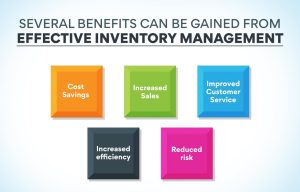The Benefits of Inventory Management
At [Your Company Name], we understand the importance of effective inventory management for businesses of all sizes. In this article, we will explore the numerous benefits that come with implementing a robust inventory management system. By optimizing your inventory processes, you can enhance efficiency, reduce costs, and improve customer satisfaction.
Increased Efficiency
One of the primary advantages of inventory management is increased efficiency. By accurately tracking your inventory levels and streamlining your ordering and fulfillment processes, you can avoid stockouts and overstocking. This ensures that you always have the right amount of inventory on hand to meet customer demand, minimizing the risk of lost sales or excess holding costs.
Cost Reduction
Implementing an effective inventory management system can significantly reduce costs for your business. By optimizing inventory levels, you can avoid tying up excessive capital in inventory that may sit idle for extended periods. Additionally, with better visibility into your inventory, you can identify slow-moving or obsolete items and take action to minimize losses. By reducing carrying costs and minimizing waste, you can improve your bottom line.
Improved Forecasting and Planning
Inventory management systems provide valuable insights into your sales patterns, allowing you to make more accurate forecasts and better plan for future demand. By analyzing historical data and trends, you can identify seasonal fluctuations, predict demand spikes, and adjust your inventory levels accordingly. This enables you to optimize your purchasing decisions, reduce lead times, and ensure that you always have the right products available when your customers need them.
Enhanced Customer Satisfaction
Efficient inventory management directly impacts customer satisfaction. By having the right products in stock and being able to fulfill orders promptly, you can meet customer expectations and provide a positive shopping experience. Avoiding stockouts and backorders not only improves customer satisfaction but also helps you build trust and loyalty with your customer base. Satisfied customers are more likely to become repeat customers and recommend your business to others, contributing to long-term success.
Streamlined Operations
An effective inventory management system can streamline your operations by automating manual tasks and reducing the chances of human error. With automated inventory tracking and real-time visibility into stock levels, you can save time and resources that would otherwise be spent on manual inventory counts and reconciliations. This allows your employees to focus on more value-added activities, such as improving customer service or developing new marketing strategies.

In conclusion, implementing a robust inventory management system offers numerous benefits for businesses. By increasing efficiency, reducing costs, improving forecasting, enhancing customer satisfaction, and streamlining operations, you can gain a competitive edge in the market. At [Your Company Name], we are committed to helping businesses optimize their inventory management processes and achieve long-term success. Contact us today to learn more about how we can assist you in reaping the benefits of effective inventory management.
Frequently Asked Questions
1. What are the benefits of inventory management?
Inventory management offers several advantages such as:
Improved cash flow
Reduced carrying costs
Minimized stockouts and overstocking
Enhanced customer satisfaction
Increased efficiency and productivity
2. How does inventory management improve cash flow?
By effectively managing inventory levels, businesses can reduce excess stock and avoid tying up unnecessary capital. This leads to improved cash flow as funds can be allocated to other areas of the business, such as marketing or expansion.
3. What are carrying costs in inventory management?
Carrying costs refer to the expenses associated with holding inventory, including warehousing, insurance, depreciation, and obsolescence. By implementing efficient inventory management practices, these costs can be minimized, leading to increased profitability.
4. How does inventory management help prevent stockouts and overstocking?
Inventory management systems provide real-time visibility into stock levels, allowing businesses to maintain optimal inventory levels. This helps prevent stockouts, ensuring that products are always available to meet customer demand. Additionally, it helps avoid overstocking, which can lead to increased carrying costs and potential losses due to obsolescence.
5. How does inventory management impact customer satisfaction?
By having accurate inventory information, businesses can fulfill customer orders promptly and accurately. This improves customer satisfaction as they receive their desired products on time, leading to repeat business and positive reviews.
6. Can inventory management increase efficiency and productivity?
Absolutely. Efficient inventory management streamlines operations by automating processes such as order placement, tracking, and replenishment. This reduces manual errors, saves time, and allows employees to focus on more value-added tasks, ultimately increasing overall efficiency and productivity.
7. Does inventory management help in forecasting and planning?
Yes, inventory management systems provide valuable data and insights that can be used for forecasting and planning. By analyzing historical sales data, businesses can make informed decisions about inventory levels, anticipate demand fluctuations, and optimize their supply chain.
8. Can inventory management reduce the risk of stock obsolescence?
Absolutely. With proper inventory management, businesses can track product expiration dates, monitor slow-moving items, and implement strategies to sell or liquidate obsolete stock before it becomes a financial burden.
9. How does inventory management impact profitability?
Effective inventory management leads to improved profitability by reducing carrying costs, minimizing stockouts, and optimizing inventory levels. It helps businesses avoid unnecessary expenses and maximize sales opportunities, resulting in higher profits.
10. Is inventory management beneficial for all types of businesses?
Yes, inventory management is beneficial for businesses of all sizes and industries. Whether it’s a retail store, manufacturing company, or e-commerce business, efficient inventory management practices can help optimize operations, improve customer satisfaction, and drive profitability.




